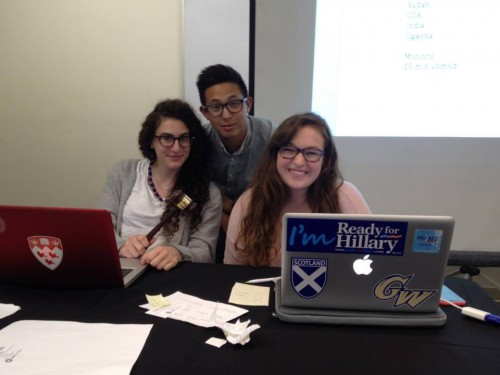
Best Delegate Diplomacy Fellows chairing a practice committee this past summer. The Diplomacy Fellows are given feedback on their performance by the delegates every day.
Chairs are seen as authority figures in Model UN because they tend to have more experience, knowledge, and skills than the delegates. With the exception of UN4MUN simulations, chairs in Model UN are usually seen as being outside of the simulation. Chairs see the delegates as the ones who are learning, and chairs are the ones evaluating delegates on the quality of the simulation.
However, I believe that being a delegate is only one part of the Model UN educational journey. Being a chair is another part of the Model UN educational journey and a step that can help students become better delegates. This means that chairs should be learning from their experience and should be evaluated on the quality of the simulation.
In fact, I believe that the best Chairs should see themselves as the best teachers, and the best teachers are facilitators. The best teachers are also the best students — they learn from their experiences to become even better teachers.
As part of the learning experience delegates are usually evaluated on their research and position papers, public speaking, lobbying or caucusing, and resolution-writing. Similarly, part of the learning experience for chairs could involve evaluation in their background guide, knowledge of the rules of procedure, ability to facilitate and push debate forward, ability to provide feedback as a teacher, or other criteria that conference organizers could determine.
There are many benefits to doing this. First, Chairs should know how well they did so that they can learn from the experience. Second, the Senior Secretariat or conference organizers should know who their best chairs are and who are the ones who need improvement in specific areas. And finally, the delegates and teachers who paid for this customer service should have a formal process to keep the conference accountable to quality standards.
We have implemented this already at the Best Delegate Summer Programs. Our Best Delegate Diplomacy Fellows do not just chair and give awards. The Best Delegate Diplomacy Fellows embody the spirit of being the best teacher possible in order to bring out the best in other delegates. Consequently, all of them are rated on their performance by their students every day through an online form and can make immediate improvements accordingly. They are also rated on their overall performance and characteristics by the students through a lengthier online survey on the last day of the program. The goal is to have every Diplomacy Fellow score 4.5 or higher out of 5 and to be able to clearly understand which coaching areas they could improve on if they did not reach that score.
The easiest way for a conference to implement this would be to create an online feedback form that gets automatically emailed to the conference organizers and the respective chair. Delegates can submit a form three times: one before the conference, one in the mid-way point of the conference, and one at the end of the last committee session. The form before the conference could capture feedback on the background guide, questions that delegates have, and what delegates hope to experience. The form at the mid-way point of the conference could capture feedback on how the chair is running committee. And the form at the end of the last committee session can capture overall chairing quality and other aspects about the conference in general. Chairs can then read their feedback and make immediately improvements.
It is my hope that more conferences adopt some type of feedback process not just for accountability to quality customer service but for the sake of investing in their Chairs’ educational experience.


